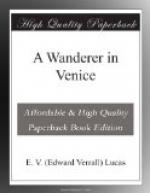But just as the motor-launch has invaded the lagoon, so has other machinery forced its way into this city—peculiarly the one place in the world which ought to have been meticulously safeguarded against every mechanical invention. When I was living near S. Sebastiano, on my way home at night the gondolier used to take me up the Grand Canal as far as the Foscari lantern and then to the left. In time we came to the campo of S. Pantaleone, where, outside a cafe, a little group was always seated, over its wine and beer, listening raptly to the music of—what? A gramophone. This means that while the motor is ousting the gondolier, the Venetian minstrel is also under death sentence.
It was the same if I chose to walk part of the way, for then I took the steamer to S. Toma and passed through the campo of S. Margherita, which does for the poor of its neighbourhood very much what the Piazza of S. Mark does for the centre of the city and the elite of the world. This campo is one of the largest in Venice, and at night it is very gay. There is a church at one end which, having lost its sanctity, is now a cinema theatre, with luridities pasted on the walls. There is another ancient building converted into a cinema at the opposite end. Between these alluring extremities are various cafes, each with its chairs and tables, and each with a gramophone that pours its notes into the night. The panting of Caruso mingles with Tetrazzini’s shrill exultation.
In summer there are occasional firework displays on the water between S. Giorgio and the Riva, supplied by the Municipality. The Riva is then crowded, while gondolas put out in great numbers, and myriad overloaded crafts full of poorer sightseers enter the lagoon by all the small canals. Having seen Venetian pyrotechny, one realizes that all fireworks should be ignited over water. It is the only way. A rocket can climb as fiercely and dazzlingly into any sky, no doubt, but over land the falling stars and sparks have but one existence; over water, like the swan “on St. Mary’s lake,” they have two. The displays last for nearly an hour, and consist almost entirely of rockets. Every kind of rocket is there: rockets which simply soar with a rush, burst into stars and fall; rockets which when they reach the highest point of their trajectory explode with a report that shakes the city and must make some of the campanili very nervous; rockets which burst into a million sparks; rockets which burst into a thousand streamers; rockets whose stars change colour as they fall; rockets whose stars do not fall at once but hang and hover in the air. All Venice is watching, either from the land or the water, and the band plays to a deserted Piazza, but directly the display is over every one hastens back to hear its strains.




